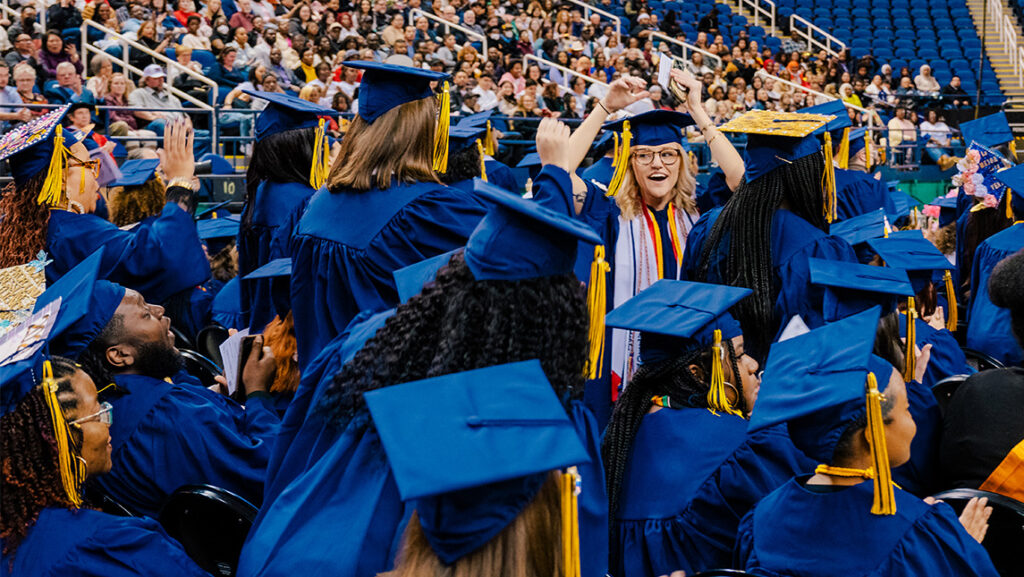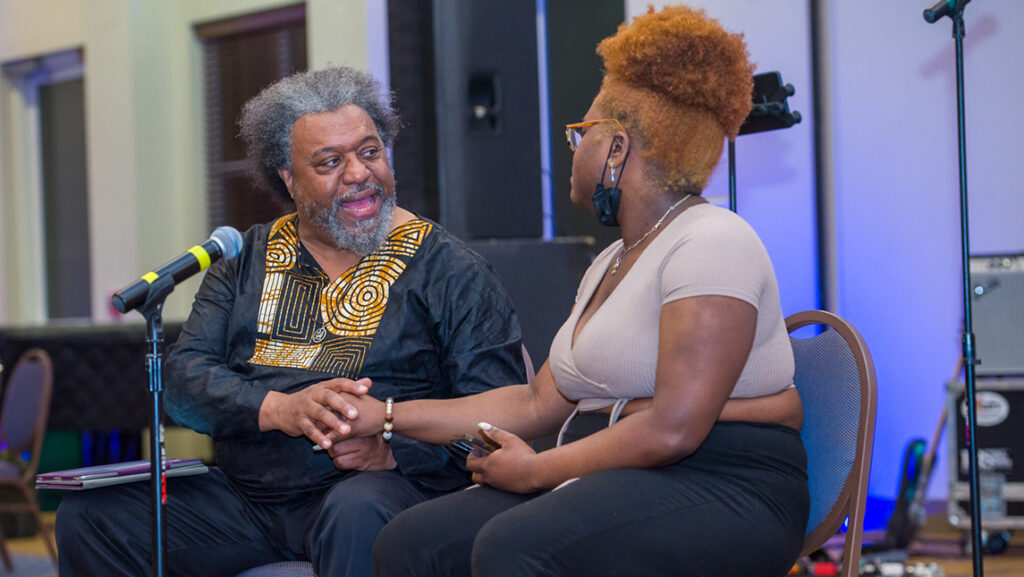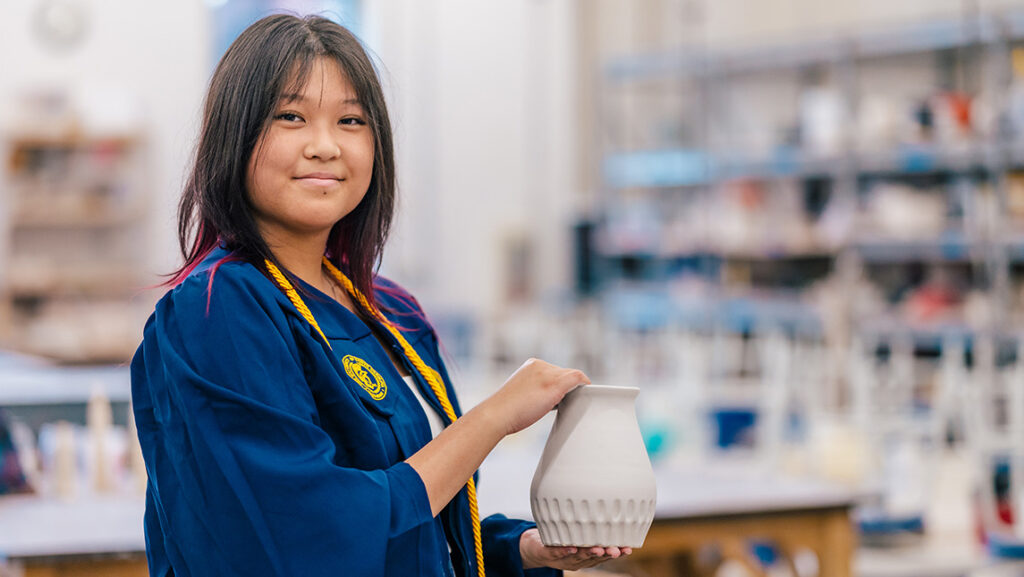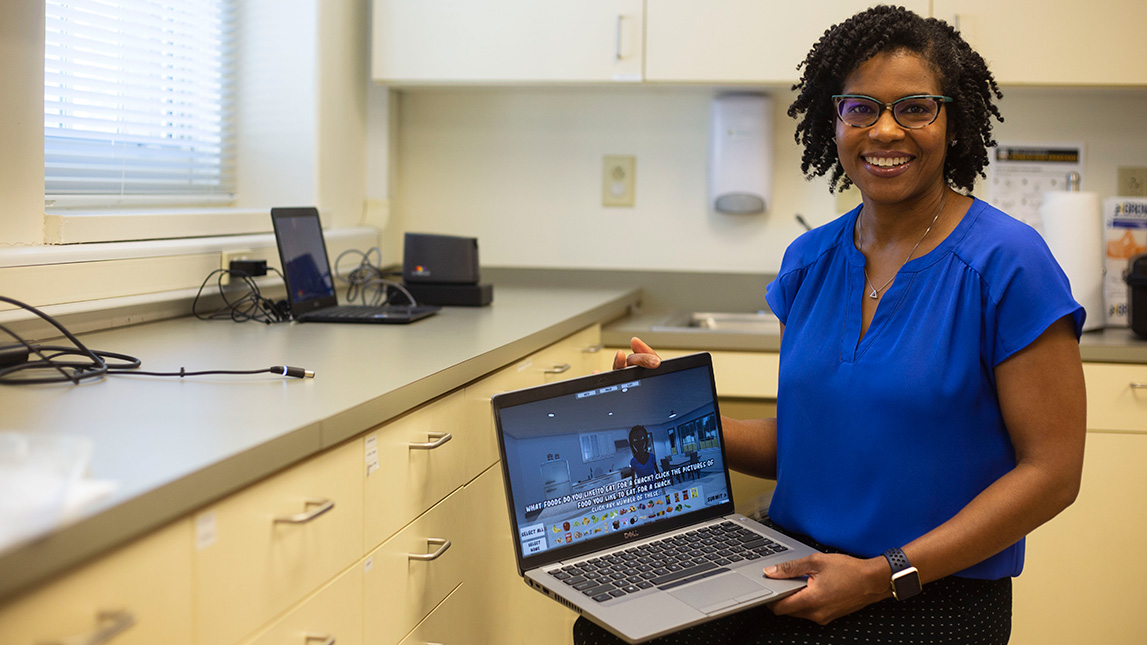
In the early 2000s, Basheerah Enahora was living in Chicago and had a successful career in food marketing. She had worked for top companies, including Kraft Foods, and risen to the rank of senior brand manager at Golden County Foods. Still, something was missing from her professional pursuits.
“I always had this love of nutrition,” Enahora said. “I just had this epiphany that I wanted to do something more fulfilling with my interest and excitement around food.”
For Enahora, pursuing a more “fulfilling” path led her to become a registered dietitian and business owner. Now, she is expanding upon her already impressive track record at UNCG where she is a doctoral candidate in the Department of Nutrition within the School of Health and Human Sciences and a Minerva Scholar. Among her accomplishments at UNCG, Enahora has co-authored three peer-reviewed publications and received a $25,000 grant from the Department of Health & Human Services to fund her doctoral research as a Behavioral Intervention Scholar.
Some future Spartans may see Enahora’s scientific success and wonder how – or even if – they could forge a similar path during their graduate studies. Enahora says they can.
“The PhD is really about perseverance more than anything,” she said. “It’s not about how smart or intelligent you are. It’s really about just being committed and consistent in your endeavors.”
From Climbing the Corporate Ladder to Impacting Lives in Dietetics
Perseverance and commitment have been guiding forces throughout Enahora’s circuitous journey to where she is today. While working full-time in food marketing, she began taking science classes at a community college.
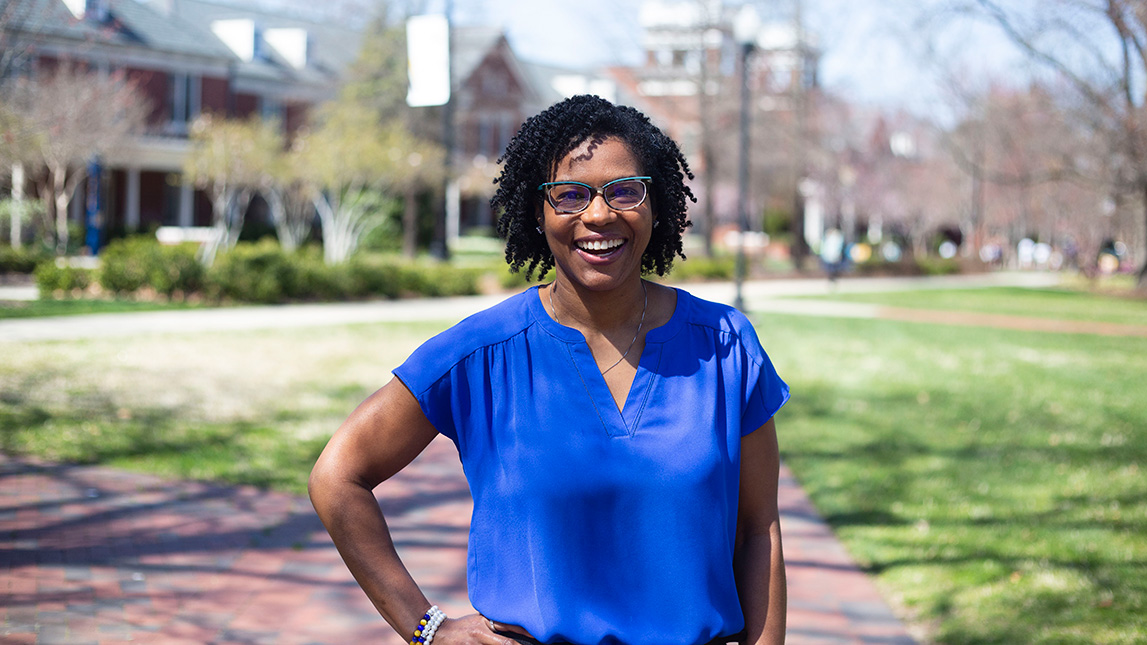
Enahora hoped to “dip her toes” into the realm of nutrition science to see firsthand if this path was the right fit for her. The water was arguably frigid. The classes she enrolled in – including organic chemistry and microbiology – are known to be some of the most challenging courses any college offers. But Enahora found resilience and wisdom in being older than her peers.
“I’m sitting in a class with 18 and 19 year olds as a 30 year old,” she said. “It just allowed me to be very focused and intentional. You’ve only got a limited amount of time to get things done.”
And get things done is exactly what Enahora proceeded to do. She completed all of her science prerequisites at Malcolm X College and then a Master of Science in Nutrition Science from the University of Illinois at Chicago. This was her second graduate degree, given that she had already received a Master of Business Administration from Duke in 2002.
With “RDN,” “MBA,” “MS,” and “LDN” all behind her name, Enahora began working as a Clinical Dietitian Nutritionist at Wake Forest Baptist Health Weight Management Center (now Atrium Health Wake Forest Baptist). In 2016, she put her combined expertise in dietetics and business into action by opening her own company, BE Nutrition LLC.
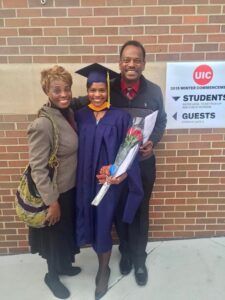
The goal of her business is to help women “embrace a holistic lifestyle.” The “BE” in the business name has dual meanings: it captures Enahora’s initials and serves as a guiding verb in the company’s main philosophy, which is to BE: 1) “mindful”, 2) “respectful of mind, body, and soul”, 3) “your own expert”, and 4) “the best version of oneself.”
Enahora offers a variety of services that are aligned with her company’s ethos, including individual nutrition counseling and corporate wellness. She also writes a blog that covers a range of topics – from educational pieces about gut health to a delectable-looking recipe for double chocolate zucchini brownies. Enahora said she enjoys engaging with clients and encouraging them to think about their health holistically and “beyond the scale.”
“Clinical practice allows me to work with people individually, which I truly enjoy,” she said. “I definitely feel like I’m making a difference every day, but then the practitioner kind of becomes the bottleneck in a sense that I’m only able to work with a certain amount of people in a day, in a week, in a year.”
This “bottleneck” concern and desire to try and help more individuals led Enahora to pursue her doctorate degree, right here at UNCG.
‘Complementing’ Clinical Practice with Doctoral Studies at UNCG
Enahora entered the doctoral program in 2019, with Jared McGuirt, assistant professor in the nutrition department, as her advisor. In the McGuirt lab, she said she has been “fully immersed” in the research process, including assisting with peer-reviewed manuscripts and grant-funded research.
“I’ve gotten both breadth and depth of research, which has been really interesting,” she said.
Currently, Enahora is focused more on “depth,” as she works to complete her rigorous dissertation research. Her work explores how African American adolescents perceive a virtual reality nutrition program. This topic dovetails with Enahora’s clinical practice because she had begun to notice more adolescents who were diagnosed with prediabetes seeking services.
“Adolescence is really that critical time period where they’re trying to develop autonomy and life skills” she said. “It’s also where we see the highest rate of childhood overweight and obesity, with greater disparities among minority youth.”
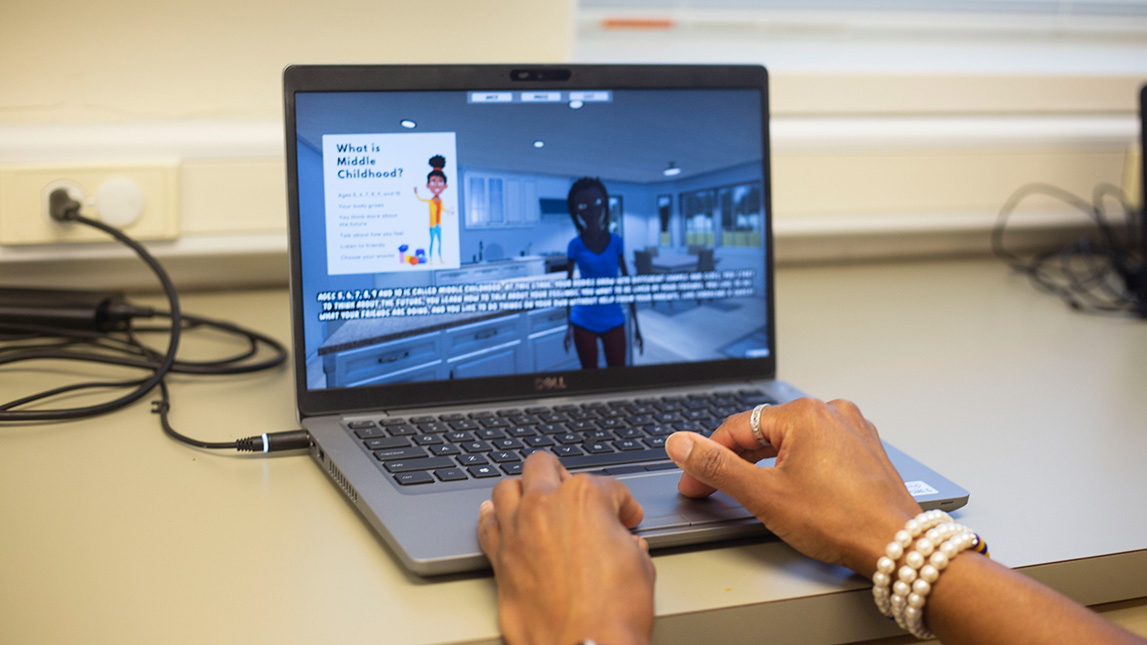
While this transitional time period is pivotal, much remains unknown about African American adolescents’ perspectives towards nutritional programs – a gap in the literature that Enahora is aiming to help fill. For her dissertation, she is assessing the appeal and adoption of a virtual reality nutrition program that the McGuirt Laboratory initially designed for children aged five to 10 years old to deliver information about “healthy eating, healthy snacking, and physical activity.”
And this isn’t a run-of-the-mill nutrition program. First, the program is customizable, Enahora explained. Adolescents can alter the appearance of the virtual agent (i.e., the avatar) that delivers the nutrition guidance.
“The avatar is kind of a virtual friend,” Enahora said. “They can make it look somewhat like themselves.”
This look-a-like avatar is also interactive. For example, when relaying information about physical activity to an adolescent, the avatar may suggest that the individual take a walk in their neighborhood or even demonstrate an exercise. Another unique feature of the program is that it can incorporate geographic information system data. If the adolescent is comfortable providing their zip code, the program can then tailor recommendations to the person’s location.
“If there aren’t a lot of grocery stores in the area, then the program will provide them with tips about what they could buy in a convenience store or what they could get from a fast-food outlet that would still be balanced,” Enahora said.

Once the avatar and adolescents’ time together has come to a close, Enahora gives them a survey to assess their attitudes towards and usage of the program. Then, Enahora conducts 24-hour dietary recalls to better understand what adolescents are eating. Finally, in a subset of youth, an objective measure of fruit and vegetable intake is obtained using an aptly named device called a Veggie Meter®. When an adolescent puts their finger in the Veggie Meter®, the device scans the skin for indicators of fruit and vegetable intake (i.e., carotenoids).
Enahora’s research extends beyond collecting this data from adolescents at the Boys & Girls Club. She is also interested in understanding how this nutrition program can be implemented in communities. Thus, for her final study, Enahora is surveying community partners, including public health programs and cooperative extension stakeholders, to learn more about how to best disseminate this program to the broader community.
She said that the long-term goal of this work is to provide information about nutrition to adolescents who may not have access to this insight otherwise – and to give them this key educational support in a way that works for them. In this way, Enahora hopes this research can help improve the lives of many individuals and break the bottleneck effect.
“In research, we can develop interventions and programs where we can affect numerous people at one time, communities at one time,” she said. “I think it just really helps to advance the practitioner’s role…and complement what’s done in practice.”
Enahora aims to continue her complimentary roles as dietitian and researcher, either as a postdoctoral associate or a faculty member once she graduates from UNCG—a place she has found warm, collegial, and “immensely helpful” to her growth as a scholar.
“I definitely find joy and passion around intervention development, particularly with youth, so I see myself focusing on that in the future,” she said.
For now, Enahora will focus on finishing up her dissertation—and adding three more letters, “PhD” to her already long list of professional titles.
Story and photography by Rachel Damiani
